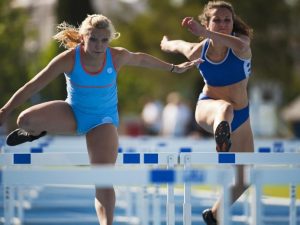Be More Deliberate and Intentional in Your Training
How often do you know why you did a drill, exercise, set, workout, etc. in practice? I am not looking for “because Coach told me to” or “that’s what my training plan had for today” or, “it’s what the greats do”. I am asking: do you know, fundamentally, why you are doing something in practice/training? What specific skill(s) are you looking to improve and for what purpose? If you do not know the answer to the above questions, then you are not maximizing your time and will not reach personal excellence in the time you desire. Fortunately, there is a relatively easy solution to this and that is to be more deliberate and intentional with practice/training.
What do I mean by deliberate and intentional? Well, let’s take a deeper look.
If you want to be a good basketball player, popular culture tells us you must make 50 straight free-throws or to finish each practice with 100, 3-point shots. This sounds great on the surface, but why do you need to do this? Yes, improving one’s shooting technique is a part of it, but practicing all these shots to improve technique is not enough to functionally improve your basketball abilities. In other words, practicing 100, 3-point shots in an empty gym after practice makes you a good 3-point shooter, but it does not make you a good basketball player. So again, I ask you, why are you practicing these 3-point shots? Hopefully, your answer is something along the lines of “The 100 3-pointers are done after practice to simulate the fatigue I would feel during the later stages of a game. I want to make sure that my technique remains sound while fatigued”. This is a great answer!
I think we can quickly look at what being more deliberate does for your overall development. For starters, deliberate practice gives you measurable goals for each and every training session. It is these goals that allow you to track your growth while serving as a source of feedback, guiding your training and development. Daily practice goals (or process goals) help to increase your self-esteem and begin to reorient your self-identity away from a results orientation. The presence and purpose of process goals helps you to “chunk” training sessions into more manageable segments.
Deliberate practice can also improve your autonomy, decision making abilities and creativity. This is done through the existence of a direction or purpose for your training. By knowing why you are doing something, you can then pay attention to the proper techniques and skill development needed to master the skill. Essentially, knowing this “why” gives you ownership over your training.
Let’s take another look at our basketball friend from above. By knowing that they want to improve their 3-point shooting abilities while fatigued, attention can be paid to the proper shooting mechanics needed. This helps them pay attention to more relevant feedback – shooting mechanics, emotion regulation, and fatigue regulation – instead of limited feedback such as a missed shot or a made shot. Developing the skill of paying attention to the correct feedback helps you be more responsive in competitions instead of reactive. It is this responsiveness that allows you to be more creative and keeps you in the present moment. So, what should this basketball player do to be more deliberate? How about shooting a 3-pointer, getting their own rebound, dribbling to the opposite court 3-point line, shooting a 3-pointer, retrieving the rebound, dribbling to the opposite court 3-point line…50 times? This works on maintaining proper technique while fatigued. It also better simulates a game environment than shooting 100 static 3-pointers from a rack of balls or having a parent/teammate collect rebounds.
As our example above demonstrates, deliberate practice helps create a competition-like environment during training. I am going to pick on hurdlers for a second. All too often you see hurdlers practicing with only hurdles placed in their lane and no one running in the other lanes. This does not make sense to me as they will NEVER encounter this environment in competition. In short, which one looks like a more effective training environment?

OR

Being deliberate in your training not only increases efficiency, it also maximizes your ability to learn from the most relevant and constructive feedback.
References
Coughlan, E. K., Williams, A. M., McRobert, A. P., & Ford, P. R. (2014). How experts practice: A novel test of deliberate practice theory. Journal of Experimental Psychology, 40(2), 449-458. Doi: 10.1037/a0034302
Ericsson, K. A., Krampe, R. T., & Tesch-Romer, C. (1993). The role of deliberate practice in the development of expertise. Psychological Review, 100(3), 363-406. Doi: 10.1037/0033-295X.100.3.363
Nash, C. S., Sproule, J., & Horton, P. (2011). Excellence in coaching: The art and skill of elite performance. Research Quarterly for Exercise and Sport, 82(2), 229-238. Doi: 10.5641/027013611×13119541883744
Partington, M., & Cushion, C. (2013). An investigation of the practice activities and coaching behaviors of professional top-level youth soccer coaches. Scandinavian Journal of Medicine & Science in Sport, 23(3), 374-382. Doi: 10.1111/j.1600-0838.2011.01383.x